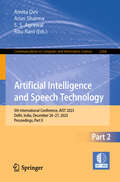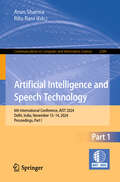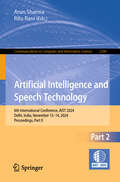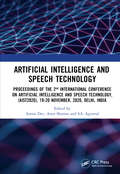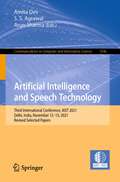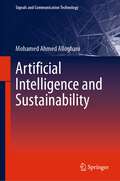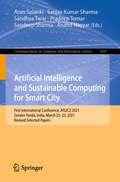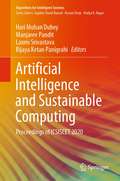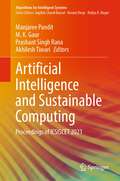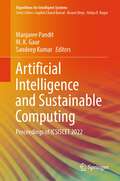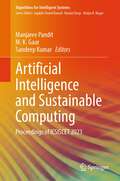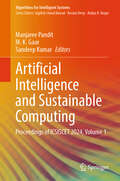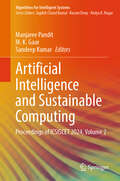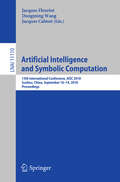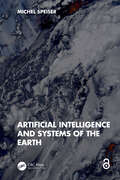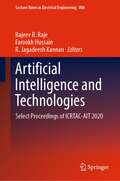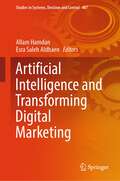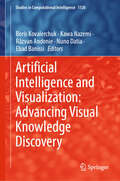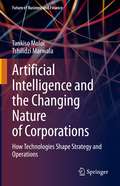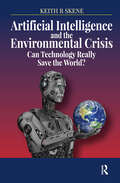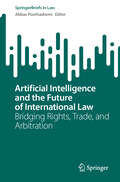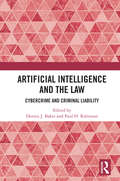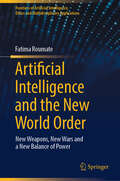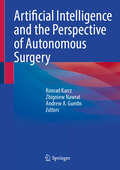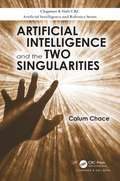- Table View
- List View
Artificial Intelligence and Speech Technology: 5th International Conference, AIST 2023, Delhi, India, December 26–27, 2023, Proceedings, Part II (Communications in Computer and Information Science #2268)
by Arun Sharma S. S. Agrawal Amita Dev Ritu RaniThis two-volume set, CCIS 2267 and 2268, constitutes the refereed proceedings of 5th International Conference on Artificial Intelligence and Speech Technology, AIST 2023, held in Delhi, India, during December 26–27, 2023. The 71 papers presented in two volumes were carefully reviewed and selected from 235 submissions. Part I focuses on Speech Technology using AI and Part II focuses on AI innovations for CV and NLP. These volumes are organized in the following topical sections: Part I: Trends and Applications in Speech Processing; Recent Trends in Speech and NLP; Emerging trends in Speech Processing; Advances in Computational Linguistics and NLP. Part II: Recent Trends in Machine Learning and Deep Learning; Analysis using Hybrid technologies with Artificial Intelligence; Exploring New Horizons in Computer Vision Research; Applications of Machine Learning and Deep Learning.
Artificial Intelligence and Speech Technology: 6th International Conference, AIST 2024, Delhi, India, November 13–14, 2024, Proceedings, Part I (Communications in Computer and Information Science #2389)
by Arun Sharma Ritu RaniThis two-volume set, CCIS 2389 and CCIS 2390, constitutes selected papers presented at the 6th International Conference on Artificial Intelligence and Speech Technology, AIST 2024, held in Delhi, India, during November 13–14, 2024. The 40 full papers and 15 short papers presented in these proceedings were carefully reviewed and selected from 398 submissions.These papers focus on Speech Technology using AI and AI innovations for CV and NLP. They have been categorized under the following topical sections:- Part I : Trends and Applications in Speech Processing; Recent Trends in Speech and NLP; Emerging trends in Speech Processing; Advances in Computational Linguistics and NLP. Part II : Recent Trends in Machine Learning and Deep Learning; Analysis using Hybrid technologies with Artificial Intelligence; Exploring New Horizons in Computer Vision Research.
Artificial Intelligence and Speech Technology: 6th International Conference, AIST 2024, Delhi, India, November 13–14, 2024, Proceedings, Part II (Communications in Computer and Information Science #2390)
by Arun Sharma Ritu RaniThis two-volume set, CCIS 2389 and CCIS 2390, constitutes selected papers presented at the 6th International Conference on Artificial Intelligence and Speech Technology, AIST 2024, held in Delhi, India, during November 13–14, 2024. The 40 full papers and 15 short papers presented in these proceedings were carefully reviewed and selected from 398 submissions.These papers focus on Speech Technology using AI and AI innovations for CV and NLP. They have been categorized under the following topical sections:- Part I : Trends and Applications in Speech Processing; Recent Trends in Speech and NLP; Emerging trends in Speech Processing; Advances in Computational Linguistics and NLP. Part II : Recent Trends in Machine Learning and Deep Learning; Analysis using Hybrid technologies with Artificial Intelligence; Exploring New Horizons in Computer Vision Research.
Artificial Intelligence and Speech Technology: Proceedings of the 2nd International Conference on Artificial Intelligence and Speech Technology, (AIST2020), 19-20 November, 2020, Delhi, India
by Amita Dev, Arun Sharma, and S. S. AgrawalThe 2nd International Conference on Artificial Intelligence and Speech Technology (AIST2020) was organized by Indira Gandhi Delhi Technical University for Women, Delhi, India on November 19–20, 2020. AIST2020 is dedicated to cutting-edge research that addresses the scientific needs of academic researchers and industrial professionals to explore new horizons of knowledge related to Artificial Intelligence and Speech Technologies. AIST2020 includes high-quality paper presentation sessions revealing the latest research findings, and engaging participant discussions. The main focus is on novel contributions which would open new opportunities for providing better and low-cost solutions for the betterment of society. These include the use of new AI-based approaches like Deep Learning, CNN, RNN, GAN, and others in various Speech related issues like speech synthesis, speech recognition, etc.
Artificial Intelligence and Speech Technology: Third International Conference, AIST 2021, Delhi, India, November 12–13, 2021, Revised Selected Papers (Communications in Computer and Information Science #1546)
by Arun Sharma S. S. Agrawal Amita DevThis volume constitutes selected papers presented at the Third International Conference on Artificial Intelligence and Speech Technology, AIST 2021, held in Delhi, India, in November 2021. The 36 full papers and 18 short papers presented were thoroughly reviewed and selected from the 178 submissions. They provide a discussion on application of Artificial Intelligence tools in speech analysis, representation and models, spoken language recognition and understanding, affective speech recognition, interpretation and synthesis, speech interface design and human factors engineering, speech emotion recognition technologies, audio-visual speech processing and several others.
Artificial Intelligence and Sustainability (Signals and Communication Technology)
by Mohamed Ahmed AlloghaniThis book gives readers the tools to craft AI systems that don't just thrive today, but endure sustainably into the future. Whether a trailblazer or an aspiring innovator, this book enables readers to resonate with the ambitions of software developers, data scientists, and AI practitioners. The author covers the latest techniques and best practices for energy efficiency, reducing carbon footprints, and ensuring fair and ethical AI. The book also addresses important issues such as AI governance, managing risks, and ensuring transparency. Topics covered include understanding the relationship between AI and sustainable development, strategies for building efficient AI systems, and ethical considerations in AI development, among others. The author includes case studies of companies and organizations that have successfully implemented sustainable AI software development practices. Therefore, this book will be of interest to AI practitioners, academics, researchers, and lecturers in computer science, artificial intelligence, machine learning and data sciences.
Artificial Intelligence and Sustainable Computing for Smart City: First International Conference, AIS2C2 2021, Greater Noida, India, March 22–23, 2021, Revised Selected Papers (Communications in Computer and Information Science #1434)
by Anand Nayyar Pradeep Tomar Sanjay Kumar Sharma Arun Solanki Sandhya Tarar Sandeep SharmaThis book constitutes selected and revised papers of the First International Conference on Artificial Intelligence and Sustainable Computing for Smart City, AIS2C2 2021, held in Greater Noida, India, in March 2021. Due to the COVID-19 pandemic the conference was held online. The 17 full papers and 3 short papers included were thoroughly reviewed and selected from 204 submissions. They are organized in the following topical sections: sentimental and emotions analysis for smart cities; smart specialization strategies for smart cities; security in smart cities; advances applications for future smart cities; healthcare in smart cities; machine learning applications in smart cities.
Artificial Intelligence and Sustainable Computing: Proceedings of ICSISCET 2020 (Algorithms for Intelligent Systems)
by Bijaya Ketan Panigrahi Manjaree Pandit Laxmi Srivastava Hari Mohan DubeyThis book presents the outcome of two-day 2nd International e-Conference on Sustainable and Innovative Solutions for Current Challenges in Engineering and Technology (ICSISCET 2020) held at Madhav Institute of Technology & Science (MITS), Gwalior, India, from December 18–19, 2020. The book extensively covers recent research in artificial intelligence (AI) that knit together nature-inspired algorithms, evolutionary computing, fuzzy systems, computational intelligence, machine learning, deep learning, etc., which is very useful while dealing with real problems due to their model-free structure, learning ability, and flexible approach. These techniques mimic human thinking and decision-making abilities to produce systems that are intelligent, efficient, cost-effective, and fast. The book provides a friendly and informative treatment of the topics which makes this book an ideal reference for both beginners and experienced researchers.
Artificial Intelligence and Sustainable Computing: Proceedings of ICSISCET 2021 (Algorithms for Intelligent Systems)
by Manjaree Pandit M. K. Gaur Prashant Singh Rana Akhilesh TiwariThis book presents high-quality research papers presented at 3rd International Conference on Sustainable and Innovative Solutions for Current Challenges in Engineering and Technology (ICSISCET 2021) held at Madhav Institute of Technology & Science (MITS), Gwalior, India, from November 13–14, 2021. The book extensively covers recent research in artificial intelligence (AI) that knits together nature-inspired algorithms, evolutionary computing, fuzzy systems, computational intelligence, machine learning, deep learning, etc., which is very useful while dealing with real problems due to their model-free structure, learning ability, and flexible approach. These techniques mimic human thinking and decision-making abilities to produce systems that are intelligent, efficient, cost-effective, and fast. The book provides a friendly and informative treatment of the topics which makes this book an ideal reference for both beginners and experienced researchers.
Artificial Intelligence and Sustainable Computing: Proceedings of ICSISCET 2022 (Algorithms for Intelligent Systems)
by Sandeep Kumar Manjaree Pandit M. K. GaurThis book presents high-quality research papers presented at 4th International Conference on Sustainable and Innovative Solutions for Current Challenges in Engineering and Technology (ICSISCET 2022) held at Madhav Institute of Technology & Science (MITS), Gwalior, India, from November 19 to 20, 2022. The book extensively covers recent research in artificial intelligence (AI) that knit together nature-inspired algorithms, evolutionary computing, fuzzy systems, computational intelligence, machine learning, deep learning, etc., which is very useful while dealing with real problems due to their model-free structure, learning ability, and flexible approach. These techniques mimic human thinking and decision-making abilities to produce systems that are intelligent, efficient, cost-effective, and fast. The book provides a friendly and informative treatment of the topics which makes this book an ideal reference for both beginners and experienced researchers.
Artificial Intelligence and Sustainable Computing: Proceedings of ICSISCET 2023 (Algorithms for Intelligent Systems)
by Sandeep Kumar Manjaree Pandit M. K. GaurThis book presents high-quality research papers presented at the 5th International Conference on Sustainable and Innovative Solutions for Current Challenges in Engineering and Technology (ICSISCET 2023) held at Madhav Institute of Technology & Science (MITS), Gwalior, India, during October 21–22, 2023. The book extensively covers recent research in artificial intelligence (AI) that knit together nature-inspired algorithms, evolutionary computing, fuzzy systems, computational intelligence, machine learning, deep learning, etc., which is very useful while dealing with real problems due to their model-free structure, learning ability, and flexible approach. These techniques mimic human thinking and decision-making abilities to produce systems that are intelligent, efficient, cost-effective, and fast. The book provides a friendly and informative treatment of the topics which makes this book an ideal reference for both beginners and experienced researchers.
Artificial Intelligence and Sustainable Computing: Proceedings of ICSISCET 2024, Volume 1 (Algorithms for Intelligent Systems)
by Sandeep Kumar Manjaree Pandit M. K. GaurThis book presents high-quality research papers presented at the 6th International Conference on Sustainable and Innovative Solutions for Current Challenges in Engineering and Technology (ICSISCET 2024) held at Madhav Institute of Technology & Science (MITS), Gwalior, India, during October 26–27, 2024. The book extensively covers recent research in artificial intelligence (AI) that knit together nature-inspired algorithms, evolutionary computing, fuzzy systems, computational intelligence, machine learning, deep learning, etc., which is very useful while dealing with real problems due to their model-free structure, learning ability, and flexible approach. These techniques mimic human thinking and decision-making abilities to produce systems that are intelligent, efficient, cost-effective, and fast. The book provides a friendly and informative treatment of the topics which makes this book an ideal reference for both beginners and experienced researchers.
Artificial Intelligence and Sustainable Computing: Proceedings of ICSISCET 2024, Volume 2 (Algorithms for Intelligent Systems)
by Sandeep Kumar Manjaree Pandit M. K. GaurThis book presents high-quality research papers presented at the 6th International Conference on Sustainable and Innovative Solutions for Current Challenges in Engineering and Technology (ICSISCET 2024) held at Madhav Institute of Technology & Science (MITS), Gwalior, India, during October 26–27, 2024. The book extensively covers recent research in artificial intelligence (AI) that knit together nature-inspired algorithms, evolutionary computing, fuzzy systems, computational intelligence, machine learning, deep learning, etc., which is very useful while dealing with real problems due to their model-free structure, learning ability, and flexible approach. These techniques mimic human thinking and decision-making abilities to produce systems that are intelligent, efficient, cost-effective, and fast. The book provides a friendly and informative treatment of the topics which makes this book an ideal reference for both beginners and experienced researchers.
Artificial Intelligence and Symbolic Computation: 13th International Conference, AISC 2018, Suzhou, China, September 16–19, 2018, Proceedings (Lecture Notes in Computer Science #11110)
by Jacques Fleuriot Dongming Wang Jacques CalmetThis book constitutes the refereed proceedings of the 13th International Conference on Artificial Intelligence and Symbolic Computation, AISC 2018, held in Suzhou, China, in September 2018. The 13 full papers presented together with 5 short and 2 invited papers were carefully reviewed and selected from 31 submissions. The AISC conference is an important forum when it comes to ensuring that ideas, theoretical insights, methods and results from traditional AI can be discussed and showcased, while fostering new links with other areas of AI such as probabilistic reasoning and deep learning.
Artificial Intelligence and Systems of the Earth
by Michel SpeiserArtificial Intelligence and Systems of the Earth is a book about the potential and capabilities of artificial intelligence (AI) and machine learning (ML) for studying the Earth. It aims to serve as an eye-opener on new avenues of scientific research that can be enabled by AI/ML. This is not meant to be a ‘how to’ book but is written to answer the question ‘what if’. It explains how these tools are currently being applied, and the new opportunities they have opened. Through many examples and application ideas from outside the Earth Sciences, the book discusses some of the most prevalent types of AI in current use, the future of AI hardware, and how AI/ML bring about change.Features Provides accessible and compact coverage on the many uses AI in Earth Science. Covers AI, deep learning, and causal modeling concepts in an easy-to-understand language. Contains a chapter on generat ive AI and its specific strengths and challenges. Includes descriptions of computer hardware for AI and where it is headed. Offers a companion website with regularly updated content. This book is an excellent resource for researchers, academics, graduate, and senior undergraduate students in Earth Science and Environmental Science and Engineering, who wish to learn how AI and ML can benefit them, its potential applications, and capabilities. The Open Access version of this book, available at http://www.taylorfrancis.com, has been made available under a Creative Commons (CC-BY) 4.0 license.
Artificial Intelligence and Technologies: Select Proceedings of ICRTAC-AIT 2020 (Lecture Notes in Electrical Engineering #806)
by Farookh Hussain R. Jagadeesh Kannan Rajeev R. RajeThis book constitutes refereed proceedings of the 3rd International Conference on Recent Trends in Advanced Computing - Artificial Intelligence and Technologies. This book covers a wide range of topics—vision, analytics, robotics, networking, health care, current pandemic issues of COVID-19, and cutting-edge technologies connected to cybersecurity in digital manufacturing and Industry 4.0. The contents of this book will be useful to researchers from industry and academia. The volume includes novel contributions and the latest developments from researchers across industry and academia. The book will serve as a valuable reference resource for academics and researchers across the globe.
Artificial Intelligence and Transforming Digital Marketing (Studies in Systems, Decision and Control #487)
by Allam Hamdan Esra Saleh AldhaenThis book explores how AI is transforming digital marketing and what it means for businesses of all sizes and looks at how AI is being used to personalize content, improve targeting, and optimize campaigns. This book also examines some of the ethical considerations that come with using AI in marketing.
Artificial Intelligence and Visualization: Advancing Visual Knowledge Discovery (Studies in Computational Intelligence #1126)
by Ebad Banissi Kawa Nazemi Boris Kovalerchuk Răzvan Andonie Nuno DatiaThis book continues a series of Springer publications devoted to the emerging field of Integrated Artificial Intelligence and Machine Learning with Visual Knowledge Discovery and Visual Analytics that combine advances in both fields. Artificial Intelligence and Machine Learning face long-standing challenges of explainability and interpretability that underpin trust. Such attributes are fundamental to both decision-making and knowledge discovery. Models are approximations and, at best, interpretations of reality that are transposed to algorithmic form. A visual explanation paradigm is critically important to address such challenges, as current studies demonstrate in salience analysis in deep learning for images and texts. Visualization means are generally effective for discovering and explaining high-dimensional patterns in all high-dimensional data, while preserving data properties and relations in visualizations is challenging. Recent developments, such as in General Line Coordinates, open new opportunities to address such challenges.This book contains extended papers presented in 2021 and 2022 at the International Conference on Information Visualization (IV) on AI and Visual Analytics, with 18 chapters from international collaborators. The book builds on the previous volume, published in 2022 in the Studies in Computational Intelligence. The current book focuses on the following themes: knowledge discovery with lossless visualizations, AI/ML through visual knowledge discovery with visual analytics case studies application, and visual knowledge discovery in text mining and natural language processing. The intended audience for this collection includes but is not limited to developers of emerging AI/machine learning and visualization applications, scientists, practitioners, and research students. It has multiple examples of the current integration of AI/machine learning and visualization for visual knowledge discovery, visual analytics, and text and natural language processing. The book provides case examples for future directions in this domain. New researchers find inspiration to join the profession of the field of AI/machine learning through a visualization lens.
Artificial Intelligence and the Changing Nature of Corporations: How Technologies Shape Strategy and Operations (Future of Business and Finance)
by Tshilidzi Marwala Tankiso MoloiThis book explains how various forms of artificial intelligence, namely machine learning, natural language processing, and robotic process automation, could provide a source of competitive advantage to firms deploying them compared to those firms that would not have deployed these technologies. The advantages of machine learning, natural language processing, and robotic process automation in strategy formulation and strategy implementation are explored. The book illustrates the potential sources of advantage for the strategy formulation and strategy implementation processes, which can be derived from the deployment of each form of artificial intelligence.
Artificial Intelligence and the Environmental Crisis: Can Technology Really Save the World?
by Keith Ronald SkeneA radical and challenging book which argues that artificial intelligence needs a completely different set of foundations, based on ecological intelligence rather than human intelligence, if it is to deliver on the promise of a better world. This can usher in the greatest transformation in human history, an age of re-integration. Our very existence is dependent upon our context within the Earth System, and so, surely, artificial intelligence must also be grounded within this context, embracing emergence, interconnectedness and real-time feedback. We discover many positive outcomes across the societal, economic and environmental arenas and discuss how this transformation can be delivered.Key Features: Identifies a key weakness in current AI thinking, that threatens any hope of a better world. Highlights the importance of realizing that systems theory is an essential foundation for any technology that hopes to positively transform our world. Emphasizes the need for a radical new approach to AI, based on ecological systems. Explains why ecosystem intelligence, not human intelligence, offers the best framework for AI. Examines how this new approach will impact on the three arenas of society, environment and economics, ushering in a new age of re-integration.
Artificial Intelligence and the Future of International Law: Bridging Rights, Trade, and Arbitration (SpringerBriefs in Law)
by Abbas PoorhashemiImagine a future of international law in which artificial intelligence reshapes human rights, trade, and arbitration. This work deals with the most burning issues of our times: how AI is no longer a tool but the force of transformation par excellence for global governance. Leading scholars and practitioners bring together an informed analysis of the challenges and opportunities artificial intelligence brings to the legal landscape. The text takes a comprehensive dimension - from ethical dilemmas to technical hurdles - by going in-depth concerning every chapter on what AI can do for international law. Whether researcher, legal professional, or policymaker, there is much to learn from these insights and how they shape the view of the role AI could potentially play within the law and redefine what justice looks like on a global scale. Prepare to be challenged, enlightened, and inspired by a work that dares to ask the hard questions - and teases at the answers waiting just beyond the horizon.
Artificial Intelligence and the Law: Cybercrime and Criminal Liability
by Dennis J. Baker Paul H. RobinsonThis volume presents new research in artificial intelligence (AI) and Law with special reference to criminal justice. It brings together leading international experts including computer scientists, lawyers, judges and cyber-psychologists. The book examines some of the core problems that technology raises for criminal law ranging from privacy and data protection, to cyber-warfare, through to the theft of virtual property. Focusing on the West and China, the work considers the issue of AI and the Law in a comparative context presenting the research from a cross-jurisdictional and cross-disciplinary approach. As China becomes a global leader in AI and technology, the book provides an essential in-depth understanding of domestic laws in both Western jurisdictions and China on criminal liability for cybercrime. As such, it will be a valuable resource for academics and researchers working in the areas of AI, technology and criminal justice.
Artificial Intelligence and the New World Order: New weapons, New Wars and a New Balance of Power (Frontiers of Artificial Intelligence, Ethics and Multidisciplinary Applications)
by Fatima RoumateThis book discusses the implications of artificial intelligence (AI) on post-COVID-19 international relations. With the decline and fall of U.S. global leadership and the emergence of new powerful actors, as hastened by the global pandemic, new arms are now used in new forms of wars with new players. The balance of power swings between geostrategic interests and those linked to the global governance of virtual space and the race to technological sovereignty. Chapters focus on the challenges imposed by these changes on different parts of the international system—law, governance, diplomacy, international psychological security—and articulate new strategies and ethical policies as possible solutions. The volume is interdisciplinary and will appeal to researchers, students, and professionals across fields interested in the ethics of AI in the international system.
Artificial Intelligence and the Perspective of Autonomous Surgery
by Konrad Karcz Zbigniew Nawrat Andrew A. GumbsThis book has two heroes - the surgeon and the robot. The education system and intelligence can create a human who is specialized in surgery. While the accurate analysis of data with machine learning, AI, can create a more autonomous robot for surgery. Currently, robots still require human input in the decision-making loop, whether or not this will always be the case is an issue that still needs to be debated, analyzed and studied, preferably by computer scientists AND surgeons. Surgeons and their patients are increasingly opting for less invasive surgeries. However, among their many advantages, there is an important issue: less invasiveness always means limited access to direct information from the operating field (3D image, local palpation sensations, all information about the "whole" patient and feedback from the accompanying team during teleoperation). To increase precision, we are increasingly using surgical robots and mechatronic instruments. The less invasive the surgery and the greater the precision of robotic micro-instruments, the greater the role of artificial intelligence methods, especially machine learning, which supports the surgeon in making decisions, planning and performing the procedure. The development of artificial intelligence and further evidence of its effectiveness in various application fields mean that the work of a doctor is changing today. In the book, we address the issue of AI surgery, asking whether this means that an AI surgeon will be created? A key question about autonomous surgical robots will come up regularly: how far can we go with their autonomy while maintaining safe and effective procedures? The book provides useful information on both early successes, failures, and expectations related to the development of new technologies in surgery. It is a guide written by various experts, intended for a wide audience: from medical development planners, through students, to doctors and decision-makers.
Artificial Intelligence and the Two Singularities (Chapman & Hall/CRC Artificial Intelligence and Robotics Series)
by Calum ChaceThe science of AI was born a little over 60 years ago, but for most of that time its achievements were modest. In 2012 it experienced a big bang, when a branch of statistics called Machine Learning (and a sub-branch called Deep Learning) was applied to it. Now machines have surpassed humans in image recognition, and they are catching up with us at speech recognition and natural language processing. Every day, the media reports the launch of a new service, a new product, and a new demonstration powered by AI. When will it end? The surprising truth is, the AI revolution has only just begun. Artificial Intelligence and the Two Singularities argues that in the course of this century, the exponential growth in the capability of AI is likely to bring about two "singularities" - points at which conditions are so extreme that the normal rules break down. The first is the economic singularity, when machine skill reaches a level that renders many of us unemployable and requires an overhaul of our current economic and social systems. The second is the technological singularity, when machine intelligence reaches and then surpasses the cognitive abilities of an adult human, relegating us to the second smartest species on the planet. These singularities will present huge challenges, but this book argues that we can meet these challenges and overcome them. If we do, the rewards could be almost unimaginable. This book covers: • Recent developments in AI and its future potential • The economic singularity and the technological singularity in depth • The risks and opportunities presented by AI • What actions we should take Artificial intelligence can turn out to be the best thing ever to happen to humanity, making our future wonderful almost beyond imagination. But only if we address head-on the challenges that it will raise. Calum Chace is a best-selling author of fiction and non-fiction books and articles, focusing on the subject of artificial intelligence. He is a regular speaker on artificial intelligence and related technologies, and runs a blog on the subject at www.pandoras-brain. com. Prior to becoming a full-time writer and speaker, he spent 30 years in business as a marketer, a strategy consultant, and a CEO. He studied philosophy at Oxford University, where he discovered that the science fiction he had been reading since boyhood was simply philosophy in fancy dress.
